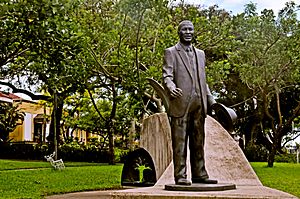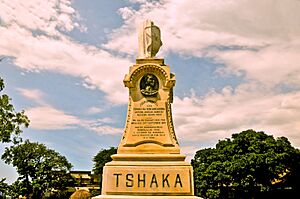KwaDukuza facts for kids
Quick facts for kids
KwaDukuza
Stanger
|
|
|---|---|
| Country | South Africa |
| Province | KwaZulu-Natal |
| District | iLembe |
| Municipality | KwaDukuza |
| Established | 1825 as Dukuza, 1873 as Stanger |
| Area | |
| • Total | 102.37 km2 (39.53 sq mi) |
| Population
(2023)
|
|
| • Total | 101,224 |
| • Density | 988.81/km2 (2,560.99/sq mi) |
| Racial makeup (2011) | |
| • Black African | 53.0% |
| • Coloured | 1.9% |
| • Indian/Asian | 43.7% |
| • White | 0.7% |
| • Other | 0.7% |
| First languages (2011) | |
| • English | 47.7% |
| • Zulu | 46.0% |
| • Xhosa | 1.4% |
| • Other | 4.8% |
| Time zone | UTC+2 (SAST) |
| Postal code (street) |
4449
|
| PO box |
4450
|
KwaDukuza, also known as Stanger, is a town in the KwaZulu-Natal province of South Africa. In 2006, the town's official name was changed to KwaDukuza. However, the local Zulu people had called it "Dukuza" long before that. The town has grown over the years, even building a large shopping mall in 2018. It also has a college called North Coast Agricultural College.
Contents
History of KwaDukuza
The town of KwaDukuza was first started around 1820 by the famous King Shaka. He named it KwaDukuza, which means "Place of the Lost Person" in Zulu. This was because his capital city had so many huts that it was like a maze.
Sadly, King Shaka was killed on September 22, 1828, by two of his half-brothers. After his death, the city was burned down. Later, in 1873, European settlers built a new town on the same spot. They named it Stanger, after a surveyor named William Stanger.
Stanger became an official municipality in 1949. It became an important center for sugar farming and trade. Today, you can visit a small museum next to the site of King Shaka's grave in the city center. There's also a special mahogany tree where King Shaka used to hold meetings, which still stands in front of the municipal offices.
Every year on September 24, the KwaDukuza Recreation Grounds host the Shaka Day festival. This is a colorful ceremony where thousands of Zulus celebrate their nation's history and culture.
In 2006, the town's name officially changed back to KwaDukuza. The KwaDukuza Museum has many historical items. It tells the story of King Shaka, the sugar industry, and the local area.
Many people from India came to KwaDukuza in the late 1800s and early 1900s. They came to work on the sugar cane farms. The first Indian families arrived in 1860. By 1911, over 100,000 Indian laborers had arrived. Most of them stayed in South Africa after their work contracts ended. The growth of the Indian community greatly changed the town's economy and culture. Today, the town celebrates events like Diwali and the Winter Fair.
In July 2021, the town faced some challenges during a period of civil unrest in South Africa.
Geography
KwaDukuza is located on the hilly North Coast of KwaZulu-Natal. It is about 73 kilometers (45 miles) north-west of Durban. It is also about 106 kilometers (67 miles) south-west of Richards Bay. The town is located 8 kilometers (5 miles) inland from Blythedale Beach. It sits along the Mbozamo River.
Other towns near KwaDukuza include Darnall (12 km away) and Ballito (30 km away).
Suburban Areas
KwaDukuza has many different neighborhoods, including:
- Dawnside
- Gledhow
- Glen Hills
- High Ridge
- Larkfield
- Northlands
- Shakville
- Townview
- Warrenton
- And many extensions of Stanger, like Stanger Ext 2, Stanger Ext 3, and so on.
Climate
KwaDukuza has a humid subtropical climate. This means it has warm, humid summers with more rain. Winters are generally mild.
The highest temperature ever recorded was 43 degrees Celsius (109 degrees Fahrenheit) on February 3, 2008. The lowest temperature recorded was 5 degrees Celsius (41 degrees Fahrenheit) on June 12, 2013.
Infrastructure
Healthcare
KwaDukuza has two main hospitals. The General Justice Gizenga Mpanza Regional Hospital is a public hospital in the city center. It is the largest public hospital in the iLembe District. The KwaDukuza Private Hospital opened in February 2018.
The town also has three public clinics. These clinics are connected to the General Justice Gizenga Mpanza Regional Hospital. They include Glenhills Clinic, KwaDukuza Clinic, and Nandi Clinic.
Schools
KwaDukuza has many schools for students of all ages. Some of the schools include:
- Stanger Manor Secondary School
- Stanger Secondary School
- Glenhills Secondary School
- Glenhills Primary School
- Stanger M.L. Sultan Secondary School
- Stanger High School
- Dawnview Primary School
- Zakkariyya Muslim School
- Stanger Primary School
- Stanger Manor Primary School
- Stanger South Secondary School
- Tshelenkosi Secondary School
- North Coast Agricultural College
Transport
Rail
KwaDukuza is at the end of the North Coast Line. This train line is part of the Metrorail KwaZulu-Natal network. It connects KwaDukuza to Durban and other towns like Shakaskraal and Ballito.
Roads
KwaDukuza is located near the N2 highway. This major highway connects Empangeni and Durban. The town is also crossed by the R74 road, which goes to Greytown. The R102 road connects KwaDukuza to towns like Shakaskraal and Darnall. There is also a small road that connects the town to Blythedale Beach on the coast.
The N2 highway has toll gates where you need to pay a fee. If you are coming from the south or heading south towards Durban, you will pass through the Mvoti Toll Plaza. The R102 road is a free alternative route if you want to avoid the toll plaza.
Notable Residents
Many important people have connections to KwaDukuza. Some of them include:
- King Shaka - The founder of the Zulu Kingdom.
- Albert Luthuli - A Nobel Peace Prize winner and anti-apartheid activist.
- Kader Asmal - A well-known politician and anti-apartheid activist.
- King Dingane - One of King Shaka's half-brothers.
- Elijah 'Tap Tap' Makhatini - A famous boxer.
 | Lonnie Johnson |
 | Granville Woods |
 | Lewis Howard Latimer |
 | James West |





